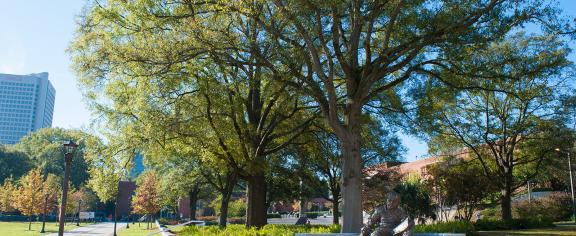2025-08-19
Agriculture is the largest cause of deforestation. So, it follows that forest expansion efforts would displace agriculture — but new research from Georgia Tech's School of Economics reports that that’s not necessarily the case.
2025-08-19
Twenty years after Hurricane Katrina’s catastrophic landfall, its legacy of destruction, displacement, and deepened inequality continues to shape communities and challenge disaster preparedness across the U.S.
2025-07-31
Georgia Tech researchers developed new statewide canopy assessment tools to help urban planners, policymakers, and communities make data-informed decisions for climate resilience.
2025-07-24
Experts say that more accurate depictions of sharks can help protect them and highlight their role in global ecosystems.
2025-07-10
A new study shows how the material made from leaves and branches that collect on forest floors can be mixed with local soil to filter out road grime before it reaches waterways.
2025-06-25
As the White House accelerates plans for a 2026 crewed mission to Mars, Georgia Tech experts highlight the engineering, scientific, and diplomatic challenges that will shape the success—and sustainability—of humanity’s next giant leap.
2024-09-18
The former interim chair for the AE School has been elected an International Fellow for his contributions to the aerospace and energy professions.
2025-04-17
Zijie (Jay) Wang (Ph.D. ML-CSE 2024) is a recipient of the 2025 Outstanding Dissertation Award from the Association for Computing Machinery Special Interest Group on Computer-Human Interaction (ACM SIGCHI).
2025-03-14
Ph.D. student Phillip Si and Assistant Professor Peng Chen developed Latent-EnSF, a technique that improves how ML models assimilate data to make predictions.
2025-03-19
Through a new review paper published in Nature, Georgia Tech scientists are revealing how decades-long research programs have transformed our understanding of evolution, uncovering secrets that would remain hidden in shorter studies.







